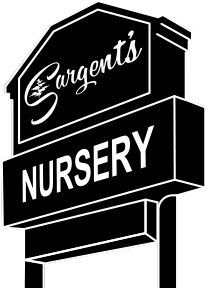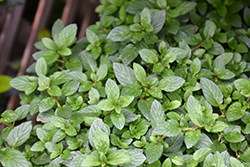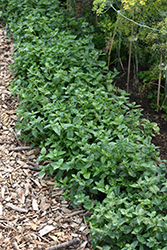Height: 24 inches
Spread: 24 inches
Sunlight:
![]()
![]()
Hardiness Zone: 5
Other Names: Mentha aquatica x spicata
Description:
A vigorous mint producing bright green, aromatic, lance shaped leaves; pink to lavender flowers rise above in a mid summer show of color; great container plant and it is suggested that planting within a pot in the ground will curtail invasiveness
Edible Qualities
Peppermint is a perennial herb that is commonly grown for its edible qualities, although it does have ornamental merits as well. The fragrant pointy green leaves can be harvested at any time in the season. The leaves have a minty taste.
The leaves are most often used in the following ways:
- Fresh Eating
- Cooking
- Seasoning
- Tea
Features & Attributes
Peppermint features bold spikes of lavender flowers with pink overtones rising above the foliage in mid summer. Its attractive fragrant pointy leaves remain green in color throughout the season.
This is an herbaceous perennial herb with a spreading, ground-hugging habit of growth. Its medium texture blends into the garden, but can always be balanced by a couple of finer or coarser plants for an effective composition. This is a high maintenance plant that will require regular care and upkeep, and should be cut back in late fall in preparation for winter. It is a good choice for attracting butterflies to your yard. Gardeners should be aware of the following characteristic(s) that may warrant special consideration;
- Invasive
Aside from its primary use as an edible, Peppermint is sutiable for the following landscape applications;
- Mass Planting
- General Garden Use
- Herb Gardens
- Container Planting
Planting & Growing
Peppermint will grow to be about 24 inches tall at maturity, with a spread of 24 inches. Its foliage tends to remain dense right to the ground, not requiring facer plants in front. It grows at a fast rate, and under ideal conditions can be expected to live for approximately 10 years. As an herbaceous perennial, this plant will usually die back to the crown each winter, and will regrow from the base each spring. Be careful not to disturb the crown in late winter when it may not be readily seen!
This plant is quite ornamental as well as edible, and is as much at home in a landscape or flower garden as it is in a designated herb garden. It does best in full sun to partial shade. It does best in average to evenly moist conditions, but will not tolerate standing water. It is not particular as to soil type or pH. It is highly tolerant of urban pollution and will even thrive in inner city environments. This particular variety is an interspecific hybrid. It can be propagated by division; however, as a cultivated variety, be aware that it may be subject to certain restrictions or prohibitions on propagation.
Peppermint is a good choice for the edible garden, but it is also well-suited for use in outdoor pots and containers. Because of its spreading habit of growth, it is ideally suited for use as a 'spiller' in the 'spiller-thriller-filler' container combination; plant it near the edges where it can spill gracefully over the pot. It is even sizeable enough that it can be grown alone in a suitable container. Note that when growing plants in outdoor containers and baskets, they may require more frequent waterings than they would in the yard or garden. Be aware that in our climate, most plants cannot be expected to survive the winter if left in containers outdoors, and this plant is no exception. Contact our experts for more information on how to protect it over the winter months.
In our experience, this plant is often able to survive in Zone 4 if given additional winter cover and specific cultural care. Please speak with Sargent’s sales staff to learn how to care for this plant.
How can we help?
We encourage you to visit the garden center to explore our full offerings and connect with our team of experts. Our team is on hand to help with any questions you have, and can help you with memorials, deliveries, special orders, and tree planting and more…





